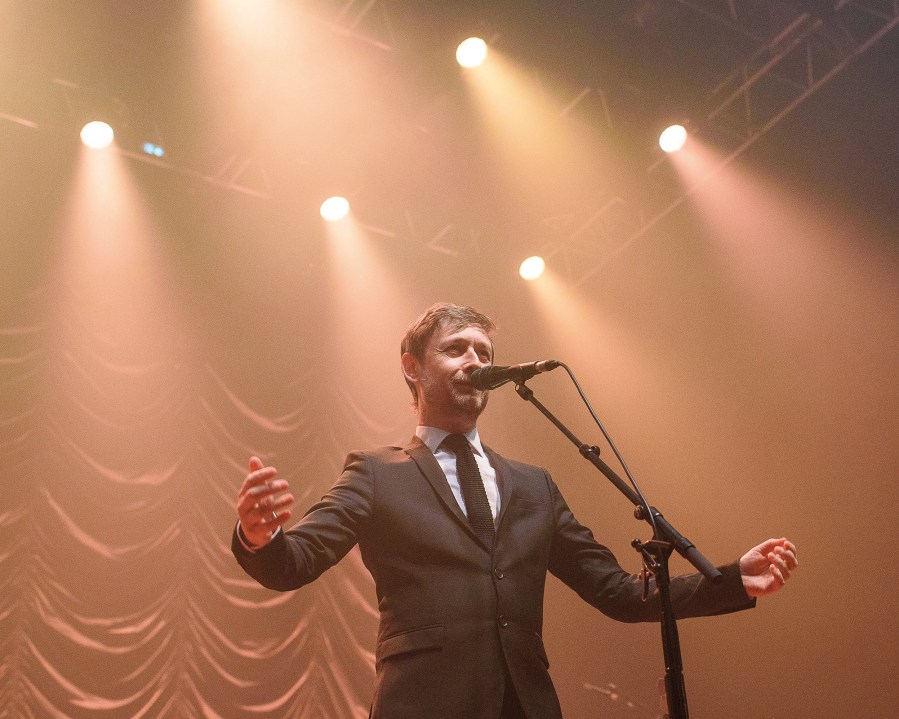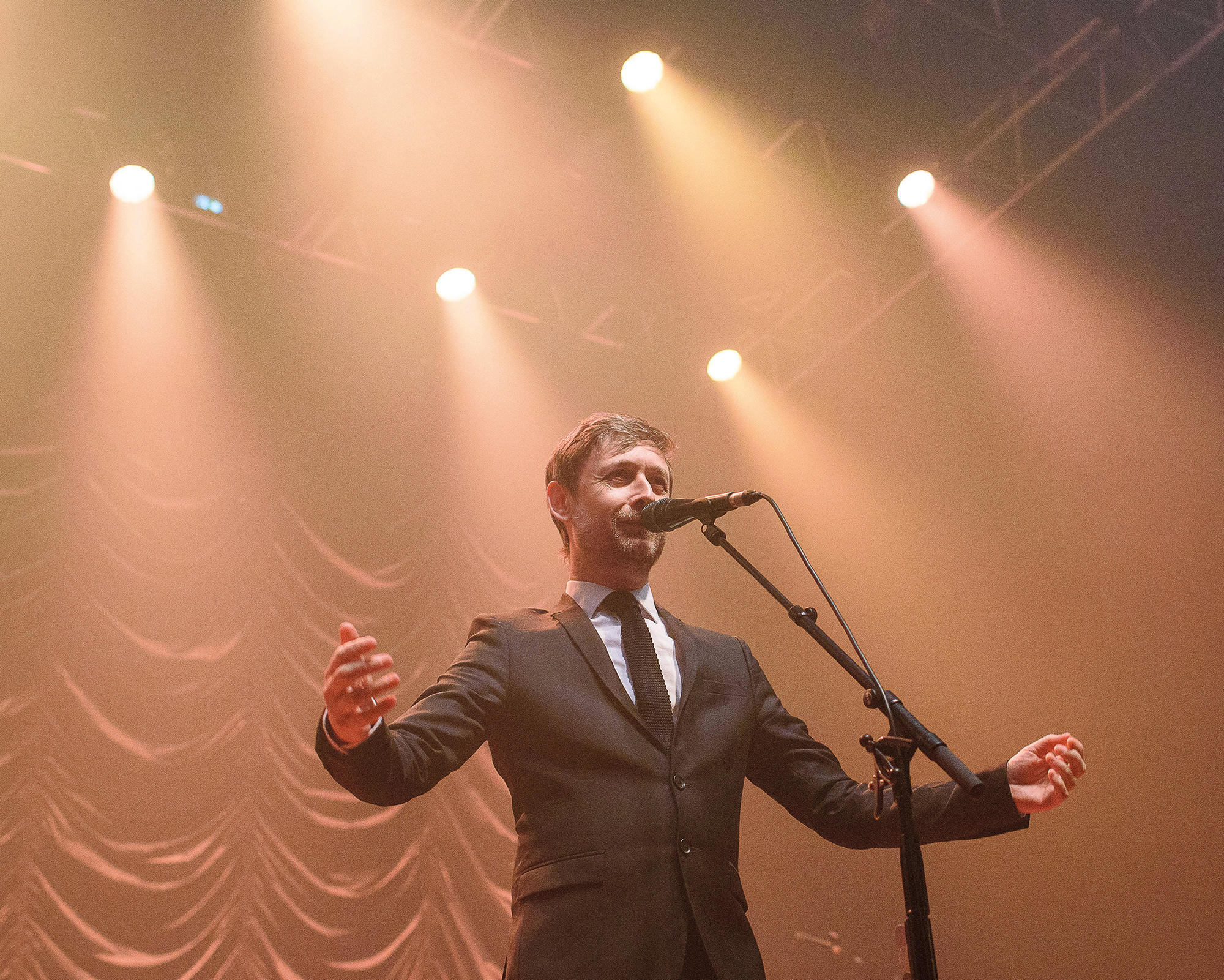
Search for a successor to Tom Lehrer, and you’ll be hard pressed to find any decent candidates. One of the few, however, who can match the wit and sophistication of the late musical satirist is the Northern Irish musician Neil Hannon. The 54-year-old is the sole permanent member of his band the Divine Comedy, and his elegant records mix Lehrer-esque wordplay with swooning orchestral pop that is in equal measure Dusty Springfield, Scott Walker and Michael Nyman.
But matters have darkened somewhat on his newest LP, Rainy Sunday Afternoon. Here, we are far from the cheeriness that many will remember on his 1990s records Casanova and Fin de Siècle. The first singles that have been released – ‘Achilles’, a loose adaptation of the Patrick Shaw-Stewart poem ‘I saw a man this morning’, and ‘The Last Time I Saw The Old Man’, a meditation on Hannon’s late father, the former Bishop of Clogher, and his death from Alzheimer’s – do not suggest that this will be a jolly album.
Speaking over Zoom from his home in Co. Kildare, Hannon rejects the suggestion that the album is his version of Nebraska or Blood on the Tracks, introspective and morose. ‘I love the idea that I would ever make such a record, but it’s never occurred to me. I don’t enjoy listening to pissed-off albums. That said, I have found myself doing darker things as I’ve got older, and this record is tuneful, but more on the melancholy side.’
Rainy Sunday Afternoon lightens up after those first two songs. But don’t expect anything like the jauntiness of his novelty tune about National Express coaches: the band’s only top 10 hit and something of a outlier. There is a deceptively pretty song about Trump and vulgar excess (‘Mar-a-Lago By The Sea’), a dramatic, Walker Brothers-esque number about romantic obsession (‘I Want You’) and the album standout, ‘The Heart Is A Lonely Hunter’. Hannon suggests that if he has shifted towards the downbeat, it’s been foisted upon him by circumstance: ‘The world has been quite a dark place for a few years now, and you can try and write a perky album about anything else, but you can’t be a person existing now and not have that gravitas come through.’
Hannon seems happy and fulfilled, but there is a sombre reserve here. ‘I have lonely and sad moments, such as when my first marriage had ended and I was in my wilderness years, sitting drinking with friends in Dublin pubs. I can think myself back into that feeling. I’ve never had a problem with reaching back into the past. It’s all perfectly fair game.’
Modern pop music, ‘the way they make these records sound, makes me want to kill myself’
The literacy of the new album will surprise no one familiar with the poised lyric-writing of songs such as ‘A Lady Of A Certain Age’. Hannon is an avid reader, E.M. Forster a favourite (‘beautifully poetic and slightly mystical’). One of the reasons for the myriad literary allusions in his songs is ‘because I was so pleased with myself for finishing the books’.
Rainy Sunday Afternoon also continues Hannon’s small-p political songwriting, although he is cautious about labelling it as such. ‘If I wanted to attack Trump, I could do much more! “Mar-a-Lago” was my attempt to talk about his character – as if he was a prisoner in a cell, musing on his beautiful lost home – rather than his baleful influence on everything. He’s a horrible specimen, and everything about him is vulgar; his house is a representation of his awful soul.’
Hannon is no Billy Bragg, however, and has no interest in becoming one. ‘I’m very aware of the fact that my father was a preacher, and when I was a teenager, I was obsessed by Bono, who was also a preacher. So while I’ve written protest songs, they have gone no further. I find that I’m better employed writing about people and their frailties in a micro, rather than macro, way.’
Where the musician feels genuinely out of place is in the world of contemporary music. ‘I just don’t listen to very much modern pop music, largely because it offends my ears. I know that makes me sound old, but I don’t care, because it’s horrible. Every now and then I hum along to something, and it’s OK, but there’s something about the way they make these records sound, and the machines that they put the vocals through, that makes me want to kill myself. I find it’s all so narcissistic and self-centred. It’s more interesting to write about the world around you, and what other people might be thinking and feeling, than just to say, “Oh, I think I might be depressed.”’
It’s all a far cry from when he started. ‘In the 1990s, there was a wonderful overlap between alternative and indie music and mainstream pop, and it was a pleasing clash that led to a lot of variety in the charts. Now, everyone has to stay in their box, not because the media have decided it, but because economics and algorithms have dictated it.’ Hannon laughs. ‘Although what the hell algorithm [my music] must create, I don’t know.’
‘I was astonished to get the call to do Wonka and that I wasn’t sacked along the way’
One possible reason for his good cheer is his successful pivot into the lucrative world of film scores. He wrote the songs for the 2023 blockbuster Wonka, directed by Paddington’s Paul King. For a self-confessed ‘control freak’ such as Hannon (he writes, arranges and produces his albums himself) the potential for strife was there. But he’s delighted with the results. ‘It’s the best thing that’s ever happened in a certain way. I was astonished firstly to get the call, then that it actually happened and that I wasn’t sacked along the way. There is so much money involved – more money than you can imagine – and so I was pleasantly surprised that I was still there at the end of it and that the songs came out really well.’ He got the gig because King was an ardent Divine Comedy fan: ‘It was a fabulous stroke of luck. I’d always thought, “Wouldn’t it be wonderful if a fan of mine in their teens or twenties went on to obtain a position of power in the media”, and, lo, it came to pass.’
The singer’s attention is now fixed on his forthcoming – and largely sold out – British and Irish tour this autumn, including two nights at the Barbican (11 and 12 October), where he played a series of triumphant career-retrospective gigs in 2022. The venues are bigger than they were a few years ago, and Hannon has a theory as to why. ‘Generationally speaking, everyone who had been first-wave Divine Comedy fans went through the 2000s and 2010s in different degrees of parenthood. I started chatting to people after shows and they’d say, “This is the first gig we’ve been to since we had our kids, and we’ve got babysitters.” It was as if there was this interruption, and now they’re back, with all of the people I’ve accumulated along the way.’
Rainy Sunday Afternoon is out on 19 September (Divine Comedy Records). The Divine Comedy will be touring their new album from 17 September until 25 October.








Comments